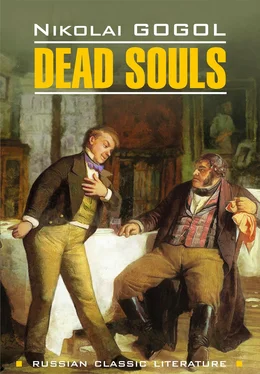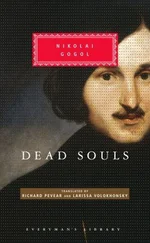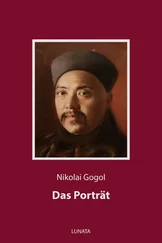Nikolai Gogol - Мёртвые души / Dead Souls
Здесь есть возможность читать онлайн «Nikolai Gogol - Мёртвые души / Dead Souls» — ознакомительный отрывок электронной книги совершенно бесплатно, а после прочтения отрывка купить полную версию. В некоторых случаях можно слушать аудио, скачать через торрент в формате fb2 и присутствует краткое содержание. Город: Санкт-Петербург, Год выпуска: 2017, ISBN: 2017, Жанр: Русская классическая проза, на английском языке. Описание произведения, (предисловие) а так же отзывы посетителей доступны на портале библиотеки ЛибКат.
- Название:Мёртвые души / Dead Souls
- Автор:
- Жанр:
- Год:2017
- Город:Санкт-Петербург
- ISBN:978-5-9925-1253-3
- Рейтинг книги:4 / 5. Голосов: 1
-
Избранное:Добавить в избранное
- Отзывы:
-
Ваша оценка:
- 80
- 1
- 2
- 3
- 4
- 5
Мёртвые души / Dead Souls: краткое содержание, описание и аннотация
Предлагаем к чтению аннотацию, описание, краткое содержание или предисловие (зависит от того, что написал сам автор книги «Мёртвые души / Dead Souls»). Если вы не нашли необходимую информацию о книге — напишите в комментариях, мы постараемся отыскать её.
На английском языке.
В формате PDF A4 сохранен издательский макет книги.
Мёртвые души / Dead Souls — читать онлайн ознакомительный отрывок
Ниже представлен текст книги, разбитый по страницам. Система сохранения места последней прочитанной страницы, позволяет с удобством читать онлайн бесплатно книгу «Мёртвые души / Dead Souls», без необходимости каждый раз заново искать на чём Вы остановились. Поставьте закладку, и сможете в любой момент перейти на страницу, на которой закончили чтение.
Интервал:
Закладка:
The gentleman peered also into the municipal gardens, which contained only a few sorry trees that were poorly selected, requiring to be propped with oil-painted, triangular green supports, and able to boast of a height no greater than that of an ordinary walking-stick. Yet recently the local paper had said (apropos of a gala) that, “Thanks to the efforts of our Civil Governor, the town has become enriched with a pleasaunce full of umbrageous, spaciously-branching trees. Even on the most sultry day they afford agreeable shade, and indeed gratifying was it to see the hearts of our citizens panting with an impulse of gratitude as their eyes shed tears in recognition of all that their Governor has done for them!”
Next, after inquiring of a gendarme as to the best ways and means of finding the local council, the local law-courts, and the local Governor, should he (Chichikov) have need of them, the gentleman went on to inspect the river which ran through the town. En route he tore off a notice affixed to a post, in order that he might the more conveniently read it after his return to the inn. Also, he bestowed upon a lady of pleasant exterior who, escorted by a footman laden with a bundle, happened to be passing along a wooden sidewalk a prolonged stare. Lastly, he threw around him a comprehensive glance (as though to fix in his mind the general topography of the place) and betook himself home. There, gently aided by the waiter, he ascended the stairs to his bedroom, drank a glass of tea, and, seating himself at the table, called for a candle; which having been brought him, he produced from his pocket the notice, held it close to the flame, and conned its tenour – slightly contracting his right eye as he did so. Yet there was little in the notice to call for remark. All that it said was that shortly one of Kotzebue’s plays would be given, and that one of the parts in the play was to be taken by a certain Monsieur Poplevin, and another by a certain Mademoiselle Ziablova, while the remaining parts were to be filled by a number of less important personages. Nevertheless the gentleman perused the notice with careful attention, and even jotted down the prices to be asked for seats for the performance. Also, he remarked that the bill had been printed in the press of the Provincial Government. Next, he turned over the paper, in order to see if anything further was to be read on the reverse side; but, finding nothing there, he refolded the document, placed it in the box which served him as a receptacle for odds and ends, and brought the day to a close with a portion of cold veal, a bottle of pickles, and a sound sleep.
The following day he devoted to paying calls upon the various municipal officials – a first, and a very respectful, visit being paid to the Governor. This personage turned out to resemble Chichikov himself in that he was neither fat nor thin. Also, he wore the riband of the order of Saint Anna about his neck, and was reported to have been recommended also for the star. For the rest, he was large and good-natured, and had a habit of amusing himself with occasional spells of knitting. Next, Chichikov repaired to the Vice-Governor’s, and thence to the house of the Public Prosecutor, to that of the President of the Local Council, to that of the Chief of Police, to that of the Commissioner of Taxes, and to that of the local Director of State Factories. True, the task of remembering every big-wig in this world of ours is not a very easy one; but at least our visitor displayed the greatest activity in his work of paying calls, seeing that he went so far as to pay his respects also to the Inspector of the Municipal Department of Medicine and to the City Architect. Thereafter he sat thoughtfully in his britchka – plunged in meditation on the subject of whom else it might be well to visit. However, not a single magnate had been neglected, and in conversation with his hosts he had contrived to flatter each separate one. For instance to the Governor he had hinted that a stranger, on arriving in his, the Governor’s province, would conceive that he had reached Paradise, so velvety were the roads. “Governors who appoint capable subordinates,” had said Chichikov, “are deserving of the most ample meed of praise.” Again, to the Chief of Police our hero had passed a most gratifying remark on the subject of the local gendarmery; while in his conversation with the Vice-Governor and the President of the Local Council (neither of whom had, as yet, risen above the rank of State Councillor) he had twice been guilty of the gaucherie of addressing his interlocutors with the title of “Your Excellency” – a blunder which had not failed to delight them. In the result the Governor had invited him to a reception the same evening, and certain other officials had followed suit by inviting him, one of them to dinner, a second to a tea-party, and so forth, and so forth.
Читать дальшеИнтервал:
Закладка:
Похожие книги на «Мёртвые души / Dead Souls»
Представляем Вашему вниманию похожие книги на «Мёртвые души / Dead Souls» списком для выбора. Мы отобрали схожую по названию и смыслу литературу в надежде предоставить читателям больше вариантов отыскать новые, интересные, ещё непрочитанные произведения.
Обсуждение, отзывы о книге «Мёртвые души / Dead Souls» и просто собственные мнения читателей. Оставьте ваши комментарии, напишите, что Вы думаете о произведении, его смысле или главных героях. Укажите что конкретно понравилось, а что нет, и почему Вы так считаете.












